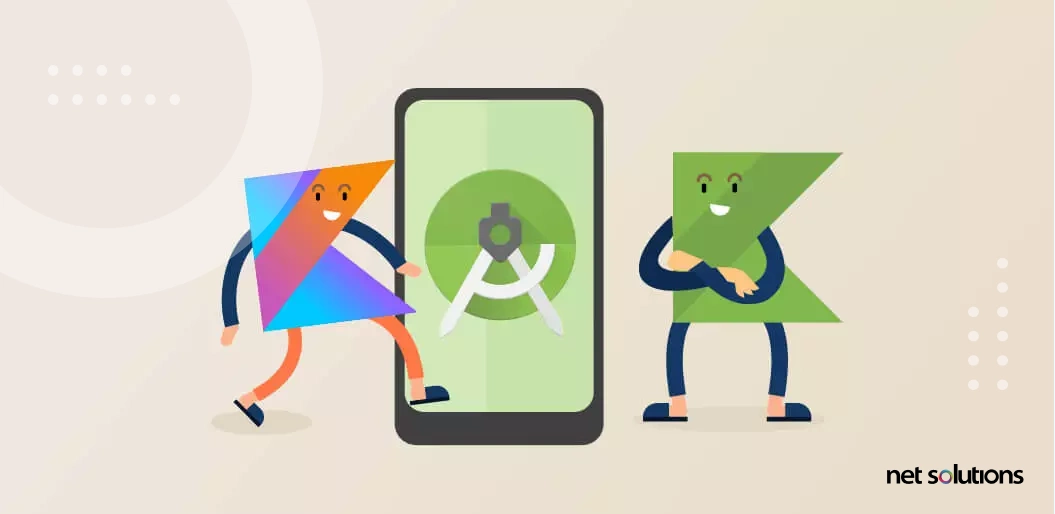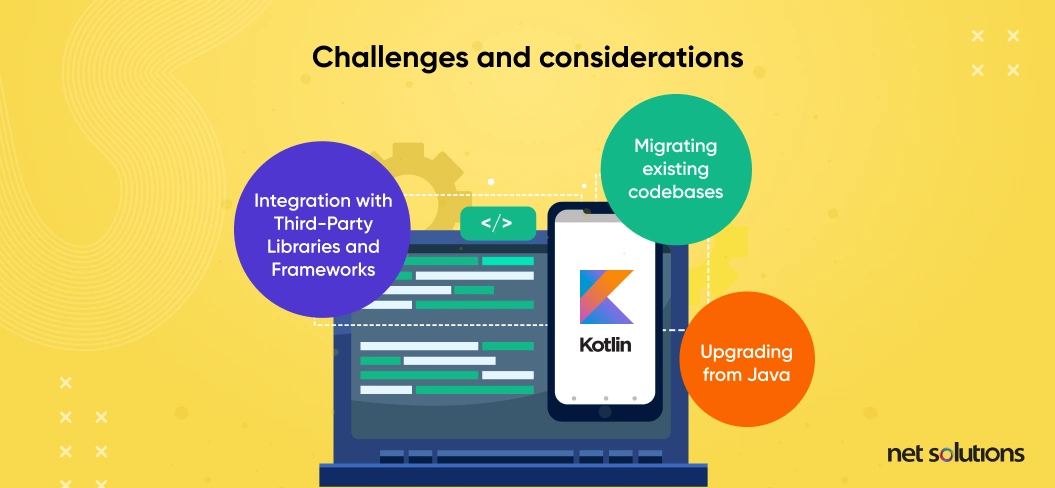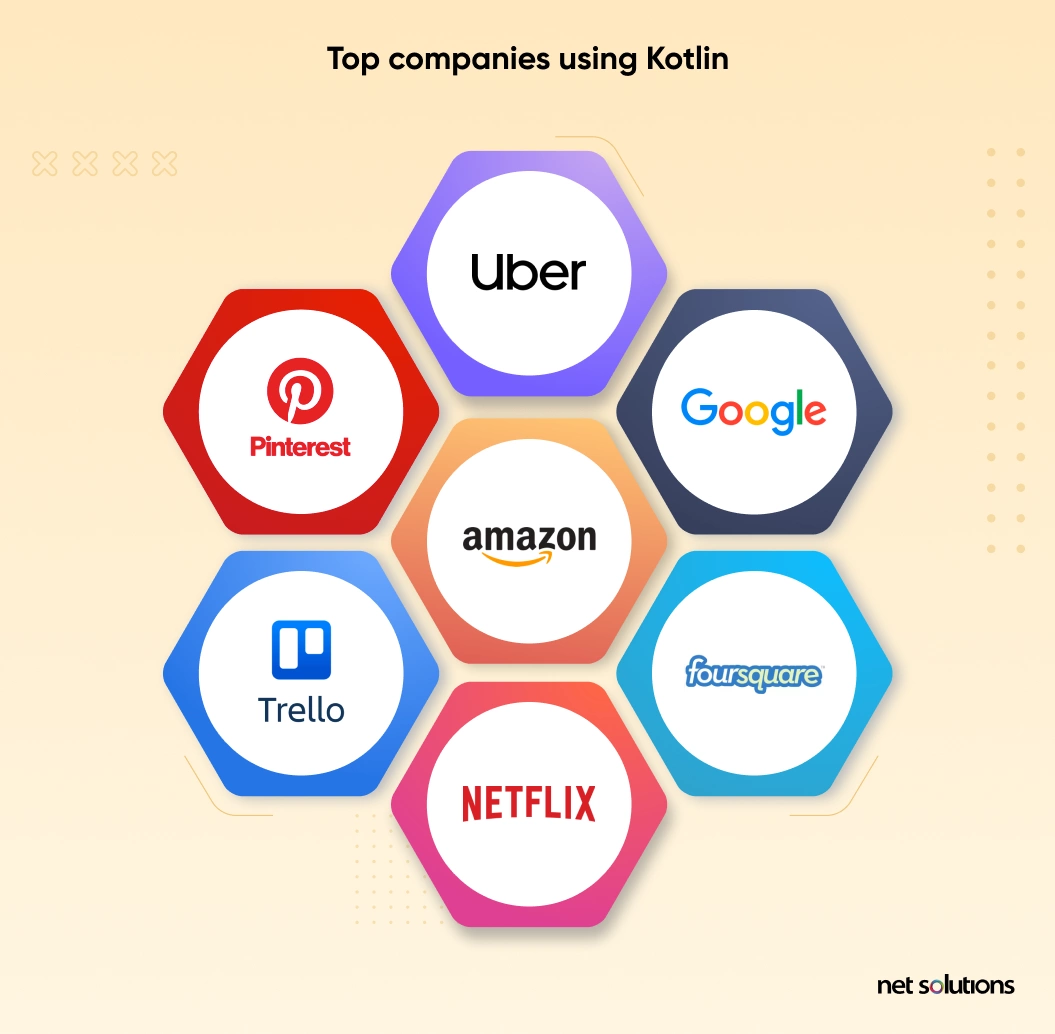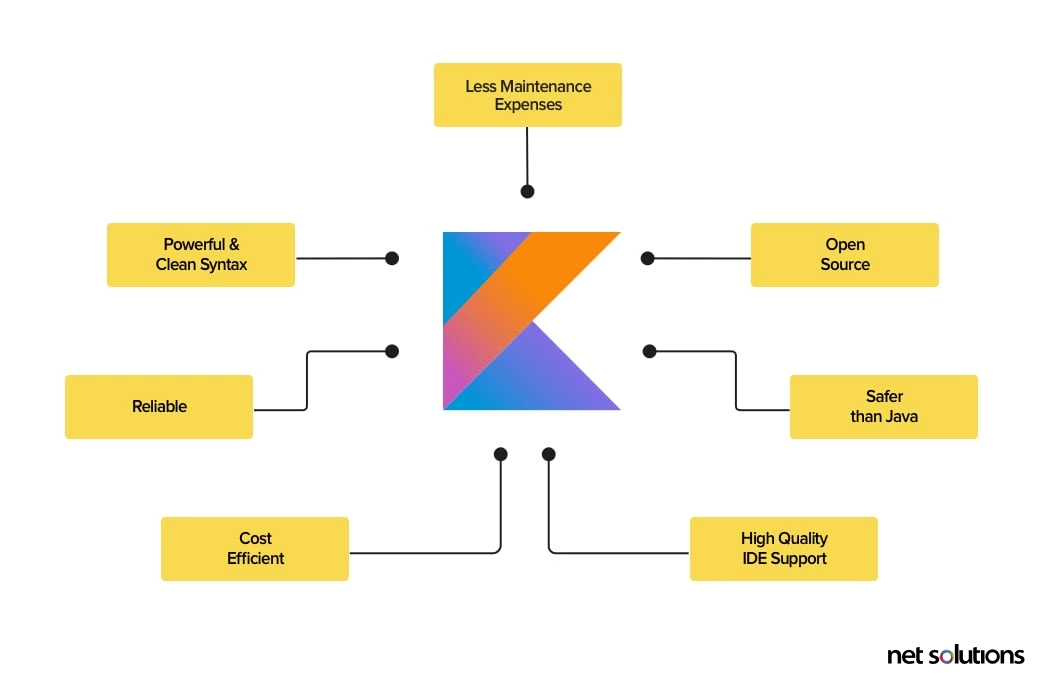In 2019, Google announced that Kotlin is the preferred language for Android app development and would be shipped with Android Studio by default starting from version 3.0.
With Google itself becoming Kotlin-oriented, many developers are moving towards adopting it. The fact that many Java apps are being rewritten in Kotlin now proves that it is the future of building Android apps. The way Swift assured the death of Objective C language, Kotlin is all set to push out Java from the Android app development ecosystem.
Kotlin has made many developers reassess their approach to creating apps considering that Java has been the foundation of innovative products for Android users, programmers, and coders for a long time.

We respect your privacy. Your information is safe.
What is Kotlin?
Kotlin is a cross-platform, statically typed, general-purpose programming language with type inference. It is designed to improve productivity in an ecosystem primarily dominated by Java. It is fully interoperable with Java and provides more expressive syntax and safety features. It is also officially supported by Google for Android development.
Significance of Kotlin for Android App Development
Kotlin was developed in 2011 by the programmers of a software product development company JetBrains in Russia and then augmented by several open-source developers.
It is a typed programming language that can run on the Java virtual machine. It is an open-source, multipurpose, and pragmatic computer programming language that combines both acquisitive and functional programming features to allow faster compilation.
Kotlin is relevant today because it is open-source and offers extensive features in mobile app development services. It has been a solution to Android developers’ problems for a while. It solves the queries that surface in Java, giving developers flexibility, safety, clarity, and tool support.
Design Challenges Faced by Kotlin
One of the design challenges that Kotlin programmers initially faced was that of the null-type system. The solutions offered by Kotlin programmers were too much of a hassle. After several iterations, the team came up with the platform types. It is the current version that Kotlin uses.
Kotlin has fixed many of the nagging issues present within the Java language.
For example, the type system controls the null references in Kotlin. Kotlin has proper function types, and it has no raw types. The arrays in Kotlin are invariant. It also does not have checked exceptions, as Java does.
The Key Benefits of Adopting Kotlin
Organizations are adopting Kotlin for their development requirements. It is a supported language for writing Android app codes. Transitioning to Kotlin is one of the best decisions an organization can make. Here are the key benefits of Kotlin:
1. Increased Code Brevity and Readability
One of the primary reasons developers prefer Kotlin over Java is the brevity that Kotlin offers. Java seems quite repetitive in comparison. Brevity ensures that there are lesser errors in code. It also implies a much faster rate of production.
2. It is an Open-Source
Since 2012, JetBrains declared Kotlin to be an open-source project. As an open-source language, a developer can expect high-quality development all the time by getting considerable support from the Kotlin Slack team.
3. It is a Mature Language with Great IDE Support
Kotlin was first created in 2011 and finally saw its first official release in 2016. It went into several stages of alpha and beta improvements before the final version.
It means that developers already used Kotlin in several projects even before release. It is practical with proven features from other programming languages and world-class IDE support. The IDE plugin works in the case of Kotlin and allows several of Java’s popular features.
4. It Provides a More Natural Way to Develop Android Apps
Kotlin is a simple yet powerful language compared to other languages. While Java suffers from severe issues, Scala’s different programming language is dense with slow compilation time. The library required to write Android apps with Kotlin is very small and doesn’t increase the method count much.
5. It is a Swift Language for Android App Development
Kotlin integrates with Android Studio, making it fast. A Kotlin project can be set up to function in less than 10 minutes, even for a first-timer.
Android 2.3 requires a plugin to integrate with Kotlin, while Android 3.0 integrates. Like Java, it can work from the IDE. It can also debug without any hiccups. All these features of Kotlin work well with many other things that Java is capable of.
6. It is Reliable Due to its Developmental Process
One of the reasons why Kotlin came into existence is because its parent company JetBrains had specific requirements from a programming language they would use themselves. It also offers practical value for its parent company, which uses it for its line of products. It makes them interested in further developing it. With Google’s support, two innovative companies are working together toward their development.
JetBrains has not only put in significant efforts in the initial idea of the language as its history suggests but is also making substantial alterations to it for its future success. Features like Kotlin Android Extensions, libraries like Anko, continuous library size optimizations, and build times suggest JetBrains’ commitment to the further development of Kotlin for Android mobile app development.
7. Developers Must Move Away from Becoming Obsolete
Once developers start using Kotlin, they realize that modern language makes their work processes more efficient and their minds more creative. Java has been around for ages and has become obsolete.
Using a modern language allows for different ways of thinking, which is critical for developers as it reflects in their work. It also makes the developer more versatile as their propensity to understand and use similar programming languages increases. All these elements add value to a developer’s profile.
8. It is Much Safer than Java/Improved Safety and Reliability
Kotlin is a much safer option than Java. One of the major problems with Java lies in the language’s design, which leads to extra work. Hence more money and time were spent on the project.
For example, nulls are the most error-prone points when working with Java. Bug managers face 90% of the errors being the Null Pointer Exception. Whereas in Kotlin, nulls do not exist unless otherwise stated.
No variable by default can be set to ‘null’ in Kotlin. If a developer wants a variable to accept nulls, he has to mark the type with a ‘?’.
The compiler will then force the developer to check ‘null’ before doing anything with the variable. Due to this, a Null Pointer Exception does not occur in Kotlin.
9. It is Easy to Learn
Like other Java-compatible languages, Kotlin is more comfortable to learn. It can easily be read by someone new to the language as the code is easy to understand. It also helps keep away from errors.
It is a language that resembles what a Java developer already understands. The only intricate part of Kotlin is the elements that Java lacks. Kotlin opens up possibilities for developers to be more creative and solve problems.
10. Enhanced Productivity and Development Speed
One of the key benefits of adopting Kotlin is enhanced productivity and development speed. The language has a more expressive syntax, which reduces boilerplate code and makes it easier for developers to read and understand their code. Kotlin also has safety features such as null safety, which helps prevent null pointer exceptions, a common source of bugs in Java. These features help to reduce the time and effort required for debugging and maintenance, allowing developers to focus on implementing new features and delivering better-quality code in less time. Additionally, the interoperability between Kotlin and Java allows developers to leverage existing Java code and libraries in their Kotlin projects, further increasing development speed.
Challenges and Considerations when Adopting Kotlin
Adopting a new programming language like Kotlin comes with challenges and considerations.
1. Upgrading from Java
For developers who are used to working with Java, the transition to Kotlin can be challenging as the syntax of the two languages is quite different. Developers need to get familiar with Kotlin’s more expressive syntax and functional programming concepts. Additionally, Kotlin’s type inference can make the code look more compact and cleaner but with the drawback of possibly increasing the app’s binary size if not used carefully. This may pose a challenge for developers working with resource-constrained devices or dealing with large codebases.
2. Migrating existing codebases
Migrating an existing codebase from Java to Kotlin can be complex and time-consuming. Automated tools can convert Java code to Kotlin, but they may only sometimes produce accurate results, and manual conversion can be error-prone. Moreover, migrating the existing codebase would require significant effort, and testing should be done thoroughly to ensure that the migrated code still works as expected. Also, the attempt to make the existing Java codebase null-safe could be substantial, as in Java, null is an accepted value, while in Kotlin, it is considered a problem to be handled.
3. Integration with Third-Party Libraries and Frameworks
Developers may encounter challenges when integrating Kotlin with third-party libraries and frameworks not explicitly designed for Kotlin. In some cases, Java versions of libraries and frameworks may need to be used, which can add complexity to the project. Moreover, when integrating with Java libraries and frameworks, developers may need to be careful when using Kotlin’s null safety features, as it can cause issues if the library or framework is not written to handle null values. This requires thorough testing of the integrated code to ensure it is working as expected.
Why Businesses are Gravitating Towards Kotlin
For a business, moving to a new tool is a well-thought decision. Any new tool being deployed aims to solve an existing problem more simpler and better. Several businesses recently have shown their support towards Kotlin by embracing it for Android app development. The most common reasons are:
- The Support: With Google officially supporting the language, this support will widen the Android app development ecosystem and provide enhanced technical support and other business capabilities. It also means more knowledge-sharing across the community of Android app developers
- Easy Migration: Secondly, businesses can migrate to Kotlin easily, making the whole process more straightforward. Along with the ease of learning the language, it removes barriers to adoption.
- Lower Cost of Development & Maintenance: Kotlin is all set for a bright future in the Android app development ecosystem. The lower app development cost and maintenance of Kotlin projects are a big plus for every business. It has many great language features and offers brevity, ensuring higher quality and faster turnaround time.
Top Companies Using Kotlin
Kotlin is here to stay, and businesses must take cognizance of that if they haven’t already. Therefore, choosing an appropriate android mobile app development technology stack is an essential step toward app development for any business. Kotlin provides an effective solution due to the speed, accuracy, flexibility, and stability it offers to solve complex business challenges.
Several influential organizations, like Prezi, Basecamp, Amazon Web Services, Pinterest, Coursera, Netflix, Uber, etc., have adopted Kotlin. Developers like Expedia, Flipboard, Square, and several others use Kotlin majorly for their Android productions.
Is Kotlin the Future of Android Development?
Strong evidence suggests that Kotlin is becoming an increasingly popular choice for Android development. Since Google announced official support for Kotlin in 2017, its usage in Android development has grown significantly, and it has become one of the most popular programming languages for developing Android apps.
Kotlin’s improved syntax and safety features make it a more productive choice than Java, and its interoperability with Java allows developers to leverage existing Java code and libraries. Additionally, Google has stated that Kotlin is now the preferred language for Android app development. All these factors make it a compelling choice for Android development, and it seems likely that its popularity will continue to grow.
Why Net Solutions Chooses the Kotlin Mobile Technology Stack for a Business
Net Solutions has also adopted Kotlin as an Android app development language for its projects.
Kotlin is a good fit for our app development process for various reasons.
- Efficient Language: Kotlin is a more efficient language for developing Android apps due to its range of features. It is a mature language with high-quality IDE support. The excellent support that comes with the Kotlin ecosystem is a big plus.
- More Productive: Kotlin’s powerful and clean syntax results in less coding than Java. It means fewer errors and less time taken for the same work output. Kotlin, an ideal developer’s language, extends these benefits to clients with more stable and high-caliber apps delivered much faster.
- Cost Saving: Kotlin’s cost efficiency is another element that positively impacts our decision to move to the language. We know how Objective-C was made obsolete by Swift, and then the maintenance of Objective-C projects proved to be a cost sinkhole. There is a high possibility that staying on Java for Android app projects could lead to mounting maintenance expenses. At Net Solutions, we want to ensure that it does not happen to any of our clients.
Finally, we know Kotlin app development results from the developer community‘s feedback over the years. It is more intuitive to developers’ requirements. It is primarily focused on developing the Android ecosystem and is helping it evolve further, which is why Net Solutions widely uses Kotlin for its Android projects.
Frequently Asked Questions
1. Is Kotlin easy to learn for developers already familiar with Java?
Kotlin is generally easy to learn for developers already familiar with Java. The syntax of Kotlin is similar to that of Java, and many concepts and patterns are the same. However, Kotlin does introduce some new features and concepts that developers may need to familiarize themselves with, such as higher-order functions and the Kotlin Standard Library.
2. Can Kotlin be used for app development on other platforms besides Android?
Kotlin is primarily designed for Android app development, but it can also be used to develop apps for other platforms, such as iOS, web, and desktop. Kotlin has strong support for cross-platform development, and many developers have successfully used it to build apps that run on multiple platforms.
3. How does the Android ecosystem support Kotlin?
Kotlin has strong support from the Android ecosystem. Google has officially endorsed Kotlin as the preferred language for Android app development, and it is now the default choice in Android Studio. The Android community has also embraced Kotlin, and many resources are available to help developers learn and use the language.
4. What are the long-term prospects for Kotlin in the Android app development industry?
The long-term prospects for Kotlin in the Android app development industry are positive. Kotlin has already seen widespread adoption among significant companies, with strong support from Google and the Android community. Kotlin will continue to grow in popularity and become the dominant language for Android app development in the future.











